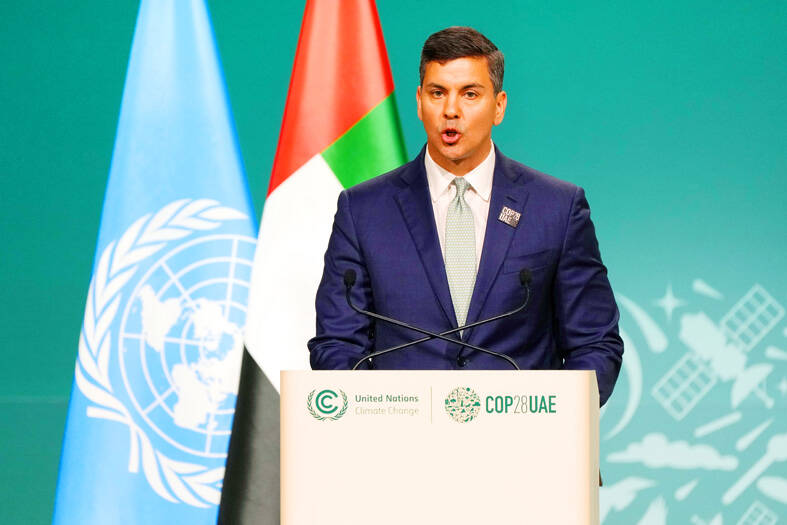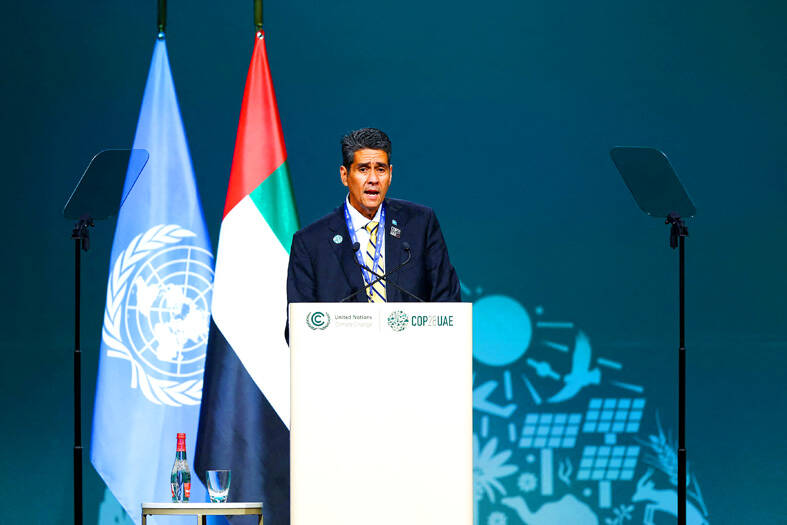Paraguayan President Santiago Pena and Palauan President Surangel Whipps Jr on Friday called for Taiwan’s inclusion in the UN’s annual conference on climate change.
Calling climate change a common challenge for all countries, Pena, speaking in his national statement at the UN Climate Change Conference (COP28) in Dubai, United Arab Emirates, urged the participation of the Republic of China in the meetings.
The conference, where government leaders and envoys gather to explore ways to tackle issues related to climate change, started on Thursday and ends on Dec. 12.

Photo: AP
Whipps echoed Pena, saying that “Taiwan must be allowed to participate in UNFCCC [United Nations Framework Convention on Climate Change] processes and share [its] expertise.”
The UNFCCC is an intergovernmental treaty developed to address climate change. The UN’s climate summits serve as the formal meetings of UNFCCC members.
“The solution to the climate crisis requires everyone’s participation,” Whipps said, adding that “the 23 million people of Taiwan and the thousands of businesses” should not be excluded.

Photo: Reuters
Taiwan has worked in tandem with Pacific islands and like-minded partners to contribute to climate change mitigation and adaptation, he said.
Taiwan was not invited to COP28 because it is not a member of the UN, and due to Beijing’s efforts to drastically limit the country’s participation in international organizations.
Since 1995, Taiwanese officials have participated in the annual conference through the government-funded Industrial Technology Research Institute, acting as a non-governmental organization observer.
Palauan Minister of Agriculture, Fisheries and the Environment Steven Victor told a separate forum that it was “unfortunate” that Taiwan had been excluded from the UNFCCC process and other global efforts to deal with climate change issues.
“While Taiwan is not a member of the UNFCCC, it has done its part as a member of the global community, and we are very much appreciative of Taiwan’s commitments,” Victor said.
The minister added that Taiwan had provided Palau with financial support to help it mitigate the effects of rising sea levels, with the construction of seal walls in particular.
Similarly, Tuvaluan Minister of Finance and Economic Development Seve Paeniu lauded Taiwan’s emergency assistance to the Pacific island nation when it was hit by a severe drought late last year, as well as by a severe cyclone in early 2020.
In Taipei, the Ministry of Foreign Affairs yesterday expressed gratitude for the support.
It also reiterated Taiwan’s willingness to fulfill its responsibility as a member of the international community, and work with like-minded partners to combat climate change in the spirit of “Taiwan can help.”

PREPAREDNESS: Given the difficulty of importing ammunition during wartime, the Ministry of National Defense said it would prioritize ‘coproduction’ partnerships A newly formed unit of the Marine Corps tasked with land-based security operations has recently replaced its aging, domestically produced rifles with more advanced, US-made M4A1 rifles, a source said yesterday. The unnamed source familiar with the matter said the First Security Battalion of the Marine Corps’ Air Defense and Base Guard Group has replaced its older T65K2 rifles, which have been in service since the late 1980s, with the newly received M4A1s. The source did not say exactly when the upgrade took place or how many M4A1s were issued to the battalion. The confirmation came after Chinese-language media reported

A Ministry of Foreign Affairs official yesterday said that a delegation that visited China for an APEC meeting did not receive any kind of treatment that downgraded Taiwan’s sovereignty. Department of International Organizations Director-General Jonathan Sun (孫儉元) said that he and a group of ministry officials visited Shenzhen, China, to attend the APEC Informal Senior Officials’ Meeting last month. The trip went “smoothly and safely” for all Taiwanese delegates, as the Chinese side arranged the trip in accordance with long-standing practices, Sun said at the ministry’s weekly briefing. The Taiwanese group did not encounter any political suppression, he said. Sun made the remarks when

The Taiwanese passport ranked 33rd in a global listing of passports by convenience this month, rising three places from last month’s ranking, but matching its position in January last year. The Henley Passport Index, an international ranking of passports by the number of designations its holder can travel to without a visa, showed that the Taiwan passport enables holders to travel to 139 countries and territories without a visa. Singapore’s passport was ranked the most powerful with visa-free access to 192 destinations out of 227, according to the index published on Tuesday by UK-based migration investment consultancy firm Henley and Partners. Japan’s and

BROAD AGREEMENT: The two are nearing a trade deal to reduce Taiwan’s tariff to 15% and a commitment for TSMC to build five more fabs, a ‘New York Times’ report said Taiwan and the US have reached a broad consensus on a trade deal, the Executive Yuan’s Office of Trade Negotiations said yesterday, after a report said that Washington is set to reduce Taiwan’s tariff rate to 15 percent. The New York Times on Monday reported that the two nations are nearing a trade deal to reduce Taiwan’s tariff rate to 15 percent and commit Taiwan Semiconductor Manufacturing Co (TSMC, 台積電) to building at least five more facilities in the US. “The agreement, which has been under negotiation for months, is being legally scrubbed and could be announced this month,” the paper said,